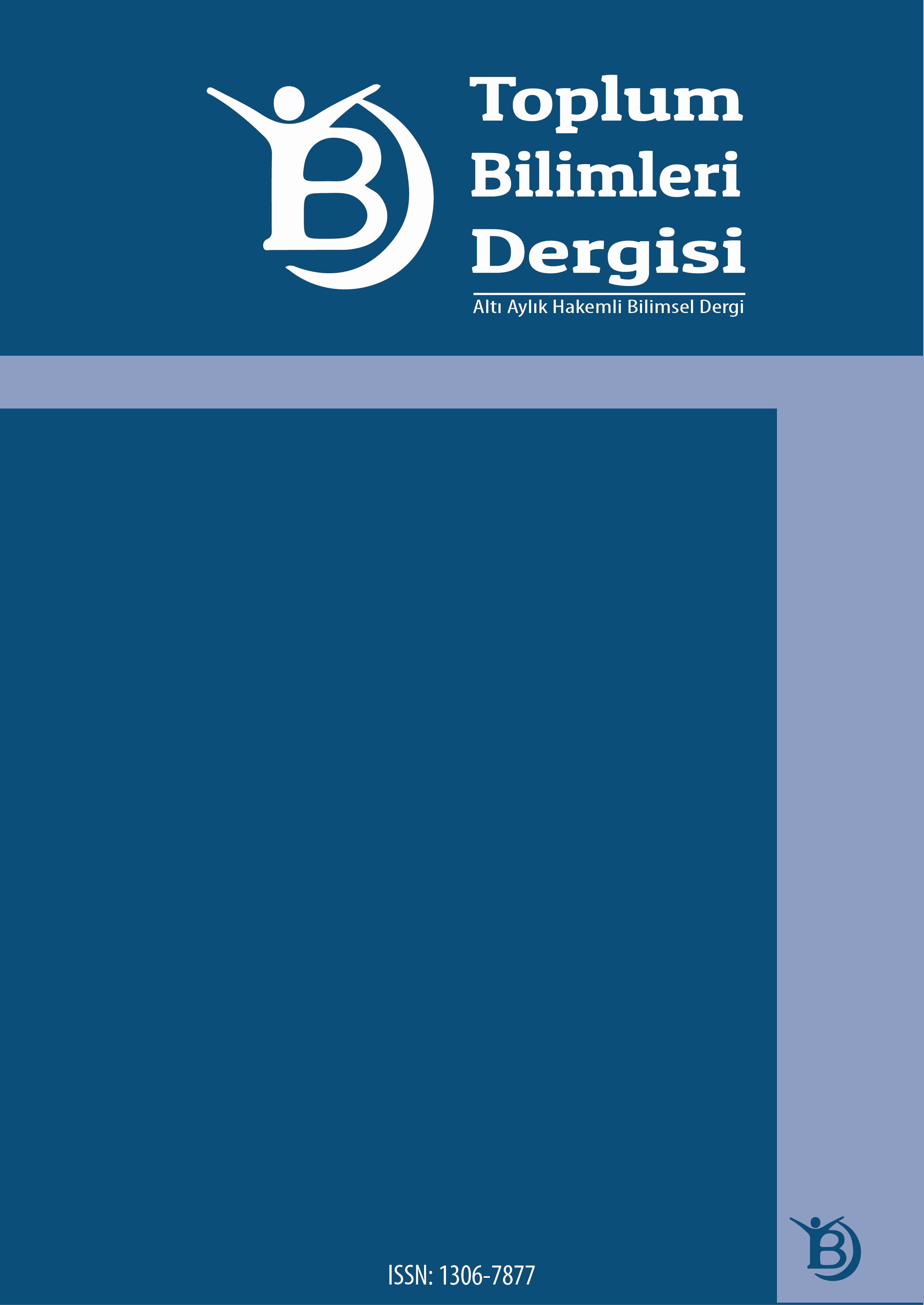Author :
Abstract
Bu makale, kavramsal ve kuramsal yaklaşımların Alevilik yazın alanında yarattğı metodolojik sonuçlarını ele almak amacıyla Alevilik yazın alanının temel kavramlarının kuramsal temellerini değerlendirmeyi hedeflemektedir. Kızılbaş- Alevi grupları tanımlamak üzere 1900’lerde Alevi yazın alanına uyarlanan heresi, heterodoksi, sekt ve senkretk kavramları, Kızılbaş-Alevi grupların doktrinel kaynaklarını aramayı hedefleyen analojik bir eğilime bağlı olarak teolojik bir modeli teşekkül etrmiştr. Heresi, heterodoksi, sekt ve senkretk kavramları- nın teolojik orijin arayışı eğilimiyle bir araya gelişi ise ampirik ve epistemik ger- çeklik arasında teşekkül eden devamsızlığın bir sonucu olmak üzere anonim ve melez bir kavramsal içerik ile metodolojik bir yadsıma sorununu beraberinde getrmiştr. Bu metodolojik eğilimin bir sonucu olmak üzere Kızılbaş-Alevi gruplar, Alevilik yazın alanında sosyal bir fenomen olmaktan daha ziyade teolojik bir konu haline gelmiştr.
Keywords
Abstract
This artcle aims to analyze theoretcal framework of the main concepts for the literature of Alevism in order to examine methodological consequences of conceptual and theoretcal approaches in the literature of Alevism. The concepts of heresy, heterodoxy, sect and syncretsm, which have been adapted to the literature of Alevism in about 1900 to describe Qizilbash-Alevi groups in Anatolia, construct a theological model depending on analogical perspectve that aims to fnd a doctrinal origin for Qizilbash-Alevism. The combinaton of the concept of heresy, heterodoxy, sect and sycretc with the tendency of the theological origin brings about anonym and hybrid conceptual meaning and controversial methodological consequences as a result of the gap constructed between empiric and epistemic reality. As a consequence of this methodological tendency, the Qizilbash-Alevi groups became a theological issue rather than a social phenomenon
Keywords
- Berlinerblau, Jacques (2001). “Toward a Sociology of Heresy, Orthodoxy, and Doxa”. History of Religions 40/4:327-351.
- Bourdieu, P. (1990). The Logic of Practice. Richard Nice (çev.). California: Stanford University Press.
- Bourdieu, P. (1993). The Field of Cultural Production Essays on Art and Literature. Randal Joh- nson (ed.). Columbia University Press.
- Cornell, Erik (2006). “A Surviving Neoplatonism: on the Creed of the Bektashi Order. Conversa- tions with a Mürsit”. Islam and Christian-Muslim Relations 17/1:1-20.
- Doja, Albert (2006a). “A Political History of Bektashism from Ottoman Anatolia to Contempo- rary Turkey”, Journal of Church and State 48 (2): 423-450.
- Doja, Albert (2006b). “Spiritual Surrender: From Companionship to Hierarchy in the History of Bektashism”. Numen, 53(4): 448-510.
- Dressler, M. (2005). “Inventing Orthodoxy: Competing Claims For Authority and Legitimacy in the Ottoman-Safavid Conflict”. Hakan T. Karateke, Maurus Reinkowski (eds). Legitimizing the Order the Ottoman Rhetoric of State Power. Leiden: Brill.
- Dressler, Markus (2008). “Religio-Secular Metamorphoses: The Re-Making of Turkish Alevism”. Joumal of the American Academy of Religion, 76/2:280-311.
- Dressler, Markus (2009).“Irène Mélikoff’s Legacy: Some Remarks On Methodology”. Türk Kül- türü ve Hacı Bektaş Veli Araştırma Dergisi 52:13-20.
- Eisenstadt, Shmuel N. (1984). “Heterodoxies and Dynamics of Civilizations”. Proceedings of the American Philosophical Society 128/2:104-113.
- Erman, Tahire ve Emrah Göker (2000). “Alevi Politics in Contemporary Turkey”. Middle Eastern Studies 36/4: 99-118.
- Karolewski, Janina (2008). “What is Heterodox About Alevism? The Development of Anti-Alevi Discrimination and Resentment”. Die Welt des Islams 48:434-456.
- Kieser, Hans-Lukas (2001). “Muslim Heterodoxy and Protestant Utopia. The Interactions betwe- en Alevis and Missionaries in Ottoman Anatolia”. Die Welt des Islams 41/1: 89-111.
- Langer, Robert ve Udo Simon(2008):“The Dynamics of Orthodoxy and Heterodoxy. Dealing with Divergence in Muslim Discourses and Islamic Studies”. Die Welt des Islams 48: 273-288.
- MacEoin, Denis (1990). “Orthodoxy and Heterodoxy in Nineteenth-Century Shi’ism: The Cases of Shaykhism and Babism”. Journal of the American Oriental Society 110/2:323- 329.
- Ocak, Ahmet Yaşar (2001). Türkler, Türkiye ve İslam, Yaklaşım, Yöntem ve Yorum Denemeleri. İstanbul: İletişim.
- Savory, R. M. (1986). “Kizil-bash”, C.E. Bosworth, E. Van Donzel, B. Lewis and Ch. Pellat, (eds.). The Encyclopaedia of Islam. New Edition (Vol:V). Leiden: Brill.
- Schrode, Paula (2008). “The Dynamics of Orthodoxy and Heterodoxy in Uyghur Religious Pra- ctice”. Die Welt des Islams 48:394-433.
- Shankland, David (2010). “Maps and the Alevis: On the Ethnography of Heterodox Islamic Groups”. British Journal of Middle Eastern Studies 37/3: 227-239.
- Swartz, D. (1996). “Bridging the Study of Culture and Religion: Pierre Bourdieu’s Political Eco- nomy of Symbolic Power”. Sociology of Religion 57(1): 71-85.
- Swatos, William H. (1976). “Weber or Troeltsch?: Methodology, Syndrome, and the Develop- ment of Church-Sect Theory”. Journal for the Scientific Study of Religion 15(2):129144.
- Şahin, İlkay (2012). “Güç İlişkileri Ağının Aktörleri Olarak Ortodoksi ve Heterodoksi: Tahtacı Raporu Örneği”. The Journal of Academic Social Science Studies JASSS 5/5:435-455.
- Vorhoff, Karin (1998): “Let’s Reclaim Our History and Culture!”: Imagining Alevi Community in Contemporary Turkey”. Die Welt des Islams 38/2:220-252.
- Weber, Max (1993). The Sociology of Religion. Ephraim Fischoff (çev). Boston: Beacon Press.
- Wilson, M. B. (2007). “The Failure of Nomenclature: The Concept of “Orthodoxy” in the Study of Islam”. Comparative Islamic Studies 3(2): 169-194.
- Zito, George V. (1983). “Toward a Sociology of Heresy”. Sociological Analysis 44/2:123-130.
